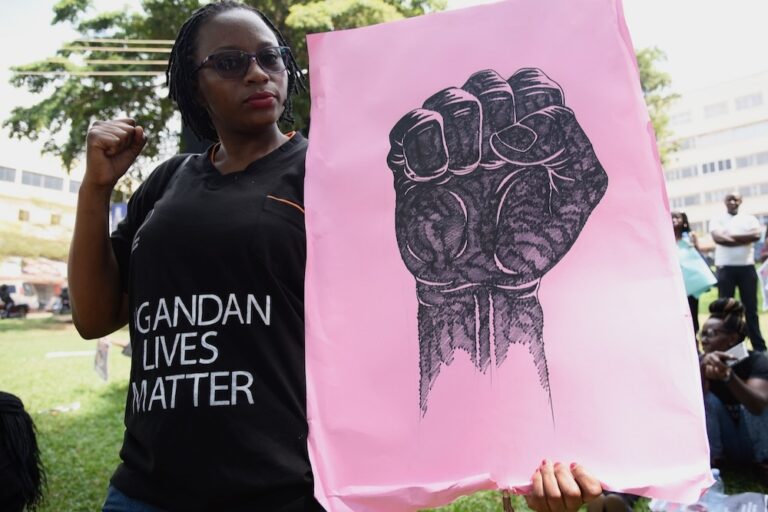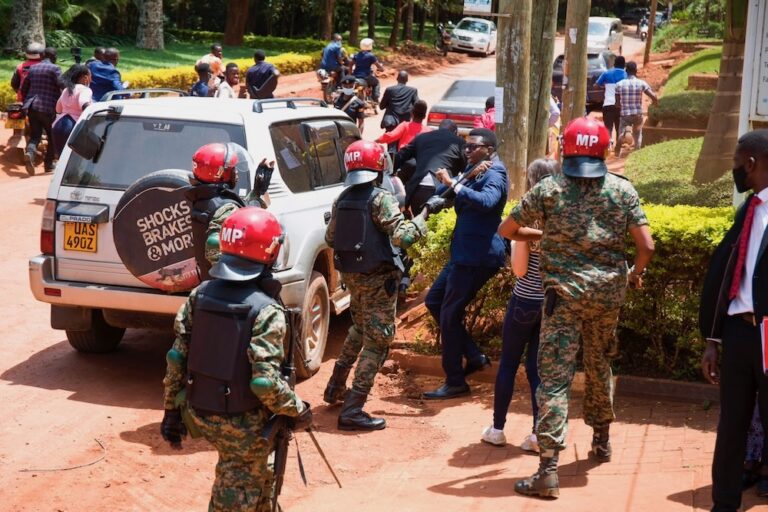Civil society organisations, opposition political parties and members of parliament have launched a media campaign against the Public Order Management Bill (POMB), a controversial law passed on 6 August 2013 by parliament.
Civil society organisations (CSOs), opposition political parties and members of parliament have launched a media campaign against the Public Order Management Bill (POMB), a law passed on 6 August 2013 by parliament in a controversial manner, that left four opposition members of the house suspended by the Deputy Speaker, Jacob Oulanyah for opposing the manner in which the process was handled. This law requires anyone seeking to hold a meeting, public rally and demonstration to first obtain police permission, under Clauses 7 and 8.
Prior to the 19 August launch, the police cordoned off the venue, the Development Network of Indigenous Voluntary Organisations (DENIVA), and engaged in a scuffle with the activists before firing tear gas and arresting 12 of them, who are being detained at Wandegeya police Station. They are mostly university students from Makerere and Kyambogo. Harris Justus Akampulira, the Prime Minister of Makerere University, had his right leg injured, while Thomas Kayanja, the Kyambogo University Off and On-affairs Campus Minister, was injured in the head by the police and rushed to hospital.
In a joint statement by CSOs, opposition political parties and other opinion leaders, read by the Executive Director of DENIVA, Justus Rugambwa, the law was characterised as an infringement of fundamental rights and freedoms, and therefore unconstitutional. “The Bill infringes on Article 29 (1) (a) (b) (c) (d) 2 and (e) of the Constitution of Uganda, which guarantees freedom of speech and expression; freedom of thought, conscience and belief; freedom to assemble and to demonstrate together with others peacefully, unarmed and to petition; and freedom of association, which shall include the freedom to form and join associations or unions, including trade unions and political and other civic organizations respectively. By legislating to control, as opposed to regulate public assemblies/meetings, it is unconstitutional.”
They further argued that the, “Law is based on a Bill that introduced retrospective legislation by affording the Inspector General of Police (IGP) or any delegated Police Officer immense discretionary powers of refusing or accepting the holding of assembly/public meeting. Section 32 of the Police Act which provided this power was annulled by the Constitutional Court Ruling in the landmark decision of Muwanga Kivumbi v. Ag (Constitutional Petition No. 9/05). It is this annulled provision that Sections 4, 5, 7 and 8 of the Public Order Management law seek to resurrect, contrary to Article 92 of the Constitution of the Republic of Uganda which stipulates that ‘Parliament shall not pass any law to alter the decision or judgment of any court as between the parties to the decision or judgment.’ On that ground alone, it is rendered a nullity.” The POM was passed in less than two minutes by the House in which the ruling National Resistance Movement (NRM) party has the majority members.
This will have grave ramifications for human rights, the worst being the total banning of demonstrations/or public gatherings hiding under the convenient legal phrases of ‘reasonable cause.’ The Bill is largely covered with deterrent, impractical, burdensome provisions branded ‘responsibilities’ placed upon the organizers and participants of public meetings which are unattainable. Among them is included Section 12 which provides for the responsibilities of the participants and organizers.
In sum, the Public Order Management law grossly undermines constitutionalism and the rule of law in Uganda. Every leader, especially at Parliamentary level, should desist from taking part in the enactment of anti-people and undemocratic laws.


